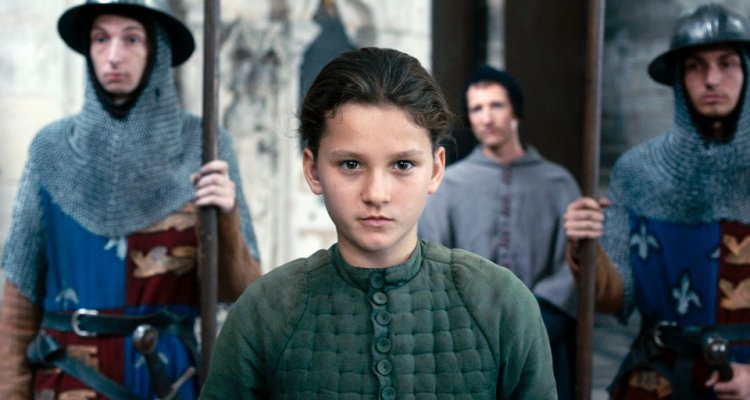In the history of her on-screen appearances, Joan of Arc has been largely silent. Interpretations by auteurs like Méliès, De Mille, and Dreyer have relied mostly on the expressive capabilities of the actresses depicting the young Catholic saint. But in “Jeanne” (“Joan of Arc”), which premiered in the Un Certain Regard section at the Cannes Film Festival, director Bruno Dumont lends Jeanne a voice, and a self-assured one at that.
READ MORE: 2019 Cannes Film Festival: The 21 Most Anticipated Movies
In Dumont’s rendition, it’s 1429, and an anachronistically young Joan of Arc (Lise Leplat Prudhomme) prepares to lead a troop of French soldiers against the English army in the Hundred Years’ War. Precociously resolute for her age, she faces off against a clergy (primarily comprised of non-professional actors), reluctant to accept the authority of a young girl with her own private theology and consequently determined to condemn her for heresy.
READ MORE: The 100 Most Anticipated Films Of 2019
Adapting the text of Charles Péguy’s novels, Dumont picks up where 2017’s “Jeannette,” his heavy-metal musical depicting an earlier stage in the heroine’s youth, left off. In the titular role, Prudhomme’s steely look of determination at least partially masks the fact that her performance feels much like rote recitation while looking straight down the barrel of the camera, which is meant to connote battle-weary wisdom beyond her years.
READ MORE: Summer Movie Preview: 35 Films You Shouldn’t Miss
Still, it feels difficult to attribute the stilted quality of Prudhomme’s acting to the young performer herself, and instead more sensible to blame the man behind the camera — for casting Prudhomme in a role demanding the complexity of emotion of a girl nine years her senior. In more ways than this one, “Jeanne” is the passion project of a director who clearly fancies himself a humorist, yet the attempt translates unfavorably as pretentious self-indulgence.
READ MORE: The 25 Best Films Of 2019 We’ve Already Seen
At two and a quarter hours, Dumont’s rendition of Joan of Arc is almost a punishing watch. For one, it follows an exact linear chronology virtually to a fault, as if the film is a visual textbook. As time labels grow more and more precise, with exact dates and “x months later” time cards, Dumont renders the feeling of zipping through time too quickly to gain any real substance, yet slowing down so often the film lacks all focus.
Tonally, the film alternates between lethargically long takes in which characters deliver unwieldy strings of dialogue and an uneasy brand of comedy that wrenches reluctant chuckles from its audience like teeth. Strange farcical beats mark an excessively, self-reflexively serious historical drama — such as a minutes-long opening sequence set to a Christophe song, which zooms in progressively closer to young Joan’s unsmiling face. Christophe’s soundtrack gives the film an anachronistically modern acoustic soundscape, like if Sufjan Stevens wrote historically conscious narrative songs about the Hundred Years’ War. At one point one of the clergymen even lip-syncs an entire song. In moments like these, “Jeanne” straddles an awkward spectrum, too comical to be considered a serious drama, yet with more severe moments that outweigh its humor.
Somehow Dumont manages to turn one of the most revolutionary, transgressive events of Western history into what feels like a three-hour bureaucratic proceeding. Clergy members, played by non-professional actors, promise to speak “in an unaffected way” then proceed to deliver profoundly affected, tedious speeches in bureaucracy-speak that barely say anything at all. Entire stretches of the film feel extraneous, as if you could fall asleep for minutes at a time, and wake up not having missed any plot. (Numerous audience members tested out this hypothesis in the theater — barring the not-insignificant number who elected instead to walk out mid-screening.)
Watching “Jeanne” becomes a test of attrition: Exactly how much can you take? One of the clergymen, in a frank comment, articulates this feeling perfectly: “I have to say I understand nothing, absolutely nothing about what we’re doing in this trial,” he says. Neither do we. [D]

